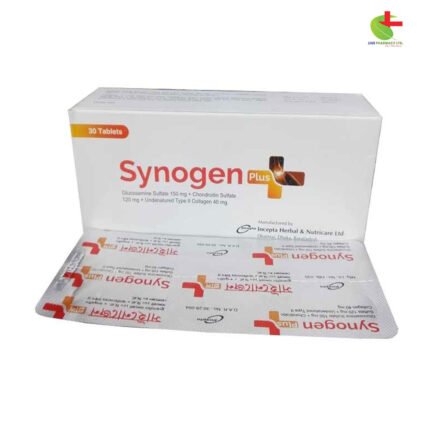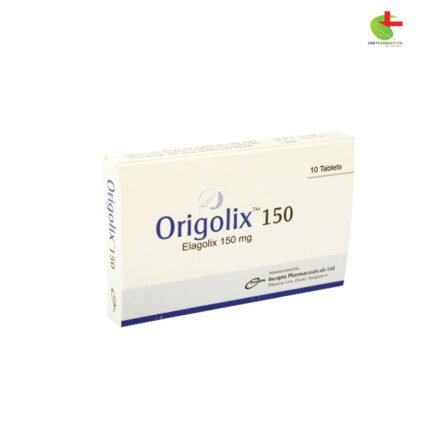Rehanzil
1,000.00৳ Strip(10)
- Indicated for managing heavy menstrual bleeding due to uterine fibroids in premenopausal women.
- Combines relugolix, estradiol, and norethindrone acetate to regulate hormonal balance and reduce bleeding.
- Taken as one tablet daily, with specific guidelines for missed doses and interactions.
- Should not be used during pregnancy, in women with certain health conditions, or in children.
 Brand
Brand
|
Incepta Pharmaceuticals Ltd |
|---|---|
 Generics
Generics
|
Relugolix + Estradiol + Norethindrone |
 Type
Type
|
Tablet |
Indications:
This medication is indicated for the treatment of heavy menstrual bleeding associated with uterine fibroids (leiomyomas) in premenopausal women.
Always consult a registered healthcare professional before using this medication.
Pharmacology:
This tablet contains a combination of relugolix, estradiol (E2), and norethindrone acetate (NETA).
- Relugolix is a non-peptide GnRH receptor antagonist that blocks pituitary GnRH receptors. This action reduces the release of Luteinizing Hormone (LH) and Follicle-Stimulating Hormone (FSH), leading to lower serum concentrations of estradiol and progesterone, thereby reducing bleeding associated with uterine fibroids.
- Estradiol binds to nuclear estrogen receptors in estrogen-sensitive tissues. It is added to prevent bone resorption, which may occur due to the reduced estrogen levels from relugolix alone.
- Norethindrone is a progestin that binds to progesterone receptors in progesterone-sensitive tissues, protecting the endometrium from the effects of unopposed estrogen.
Dosage and Administration:
Before starting treatment, ensure pregnancy is excluded and discontinue any hormonal contraceptives.
- Take one tablet orally once daily.
- If a dose is missed, take it as soon as possible on the same day and resume your regular schedule the next day.
- If using oral P-gp inhibitors, take the tablet at least 6 hours before the inhibitor.
Safety and efficacy in pediatric patients have not been established.
Always follow the advice of a registered healthcare provider when using this medication.
Drug Interactions:
- P-gp Inhibitors: Co-administration may increase the AUC and peak concentration (Cmax) of relugolix, raising the risk of side effects.
- Combined P-gp and Strong CYP3A Inducers: This combination may decrease the AUC and Cmax of relugolix, estradiol, and norethindrone, potentially reducing therapeutic efficacy.
- Grapefruit Juice: Can increase plasma levels of drugs metabolized by the CYP450 3A4 enzyme.
Contraindications:
This medication should not be used in individuals with:
- High risk of thrombotic or thromboembolic disorders
- Pregnancy
- Osteoporosis
- Current or past history of breast cancer or other hormone-sensitive cancers
- Severe liver disease
- Undiagnosed abnormal uterine bleeding
- Known hypersensitivity to relugolix, estradiol, or norethindrone acetate
Side Effects
The most common adverse effects (occurring in more than 3% of patients) include:
- Hot flashes
- Night sweats or hyperhidrosis
- Uterine bleeding
- Hair thinning (Alopecia)
- Decreased libido
Pregnancy and Lactation
Animal studies suggest this medication may cause early pregnancy loss. If pregnancy occurs during treatment, discontinue use immediately.
There is no data on the presence of relugolix or its metabolites in human milk. However, since relugolix has been detected in milk in lactating rats, it is likely to be present in human milk.
Precautions and Warnings
- Thromboembolic Risk: Discontinue if any thrombotic, cardiovascular, or cerebrovascular events occur.
- Bone Health: May cause irreversible bone mineral density (BMD) loss.
- Mental Health: Monitor for symptoms of depression, anxiety, or mood changes. Seek medical advice if symptoms worsen.
- Pregnancy Loss Risk: Use effective non-hormonal contraception to avoid early pregnancy loss.
Overdose Effects
Excessive use may cause nausea, vomiting, breast tenderness, abdominal pain, fatigue, drowsiness, and withdrawal bleeding. Supportive care is recommended. The effect of hemodialysis on relugolix, estradiol, or norethindrone is unknown.
Therapeutic Class
- GnRH Antagonist
Storage Instructions
Store in a cool, dry place below 30°C, away from light and moisture. Keep out of reach of children.













Reviews
There are no reviews yet.